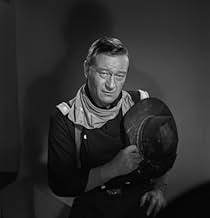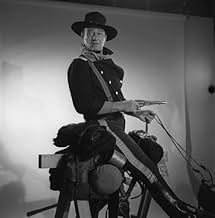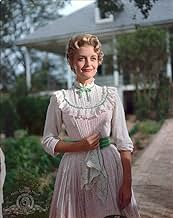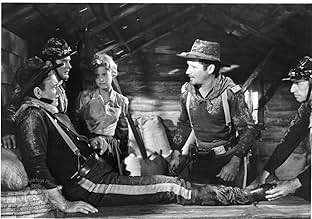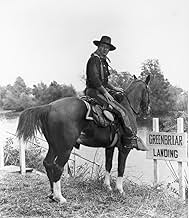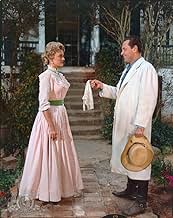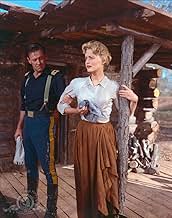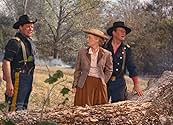En 1863, un batallón de La Unión debe hacer una incursión tras las líneas confederadas en Mississippi para destruir los ferrocarriles enemigos, pero una bella prisionera sureña y el médico d... Leer todoEn 1863, un batallón de La Unión debe hacer una incursión tras las líneas confederadas en Mississippi para destruir los ferrocarriles enemigos, pero una bella prisionera sureña y el médico de la unidad causan tensiones dentro de las filas.En 1863, un batallón de La Unión debe hacer una incursión tras las líneas confederadas en Mississippi para destruir los ferrocarriles enemigos, pero una bella prisionera sureña y el médico de la unidad causan tensiones dentro de las filas.
- Dirección
- Guionistas
- Elenco
- Premios
- 1 nominación en total
- Dirección
- Guionistas
- Todo el elenco y el equipo
- Producción, taquilla y más en IMDbPro
Opiniones destacadas
Ford's battle scenes are as usual patriotically free of blood and require no reflection but the imagery is great (you want to join the cavalry) and the detail outstanding. We hear the clanking of canteens and cookpots, an argument over the placement of latrines and see the only filmic presentation of the making of Sherman Neckties (warped rails). The Ford family is well represented though we miss Harry Carey Jr (and Paul Fixx must have been tied up with the Rifleman).
If we had to have a love interest, Maureen Ohara could have at least tied this to "Rio Grande" and furthered the Ford library.
Normally wonderful Bill Holden has only brief bright moments and is mostly going through the motions and hung-over here. Neither Wayne nor Ford were slouches when it came to curling whiskey but by his own admission Holden aggravated all and threatened production with reckless, drunken extracurriculae, breaking an arm falling from a bridge.
This film was an inspiration in grade school and a guilty pleasure since.
It's the sort of Ford film that must have been hard on the actors, riding through swamps on horseback and engaging in fierce battles when pursued by Rebel forces. William Holden has some wonderful moments as a doctor who is constantly bickering with John Wayne. Their exchanges provide plenty of tension and humor--and both actors are at their best under Ford's direction.
A good Civil War western combining magnificent photography, good performances and some rousing battle scenes. The horrors of war are not ignored and there are some sentimental moments that never strike a false note.
Historical inaccuracy aside though the movie did quite well. The film showed multiple viewpoints and a fair degree of respect for most of them. It showed aspects of the war that were generally ignored in other films of the period -- the bloody horror of battlefield amputations, the desire of people to give up on the whole thing (I can't think of an earlier film that talked about deserters and the way they disrupted the southern home front), and the pain of the sheer physical destruction of the war -- a pain that affected the destroyers as well as the victims, something Gone With the Wind never quite admitted.
Some posters have complained about southern belle Hannah Hunter's overuse of sex appeal to spy on Union soldiers -- while there was no historical Hannah Hunter there were plenty of southern women who did just that, including Belle Boyd, Rose Greenhow and others. Some posters have complained about the way the film trivializes slavery -- this is unfair. It underplays slavery but never trivializes it. It shows conflicts within the Union army about the institution and addresses the issue of personal loyalty between some slaves and masters without glamorizing the institution as a whole. Does the film go far enough by modern standards? No. But it goes much farther than its contemporary and treats the slavery issue more honestly than modern travesties like Gods And Generals.
One poster actually complained about how inaccurate southern snipers were -- this is completely unfair. There was no indication that the "snipers" were specially trained men with Whitworth rifles or anything like that. They looked more like ordinary troopers out skirmishing, or perhaps the even more poorly trained militia. Ordinary soldiers fired more than 100 rounds for every hit they scored, so poor shooting on either side is nothing to be surprised about.
8 out of 10
Col. John Marlowe (John Wayne) is assigned to take a small brigade of cavalry from Tennessee, ride hundreds of miles into the Confederate territory and destroy the railroad at Newton Station, Mississippi, thereby cutting the supply line to Vicksburg... To do it, he will have to avoid all contact with rebel forces until he has reached his target...
The first problem Marlowe encounters is Major Hank Kendall (William Holden), an obstinate surgeon who will be accompanying the force... Marlowe has the expected contempt of the combat soldier for his colleague who carries no arms... In addition, when Kendall asserts his rights as an officer in the medical corps to declare unfit any soldier he considers so, Marlowe and Kendall clash...
The next problem is Marlowe's second in command, Col. Secord (Willis Bouchey), who makes no secret of his plans to use his military career to further his strong political ambitions...
The third problem is the high-spirited belle Hannah Hunter (Constance Towers). This violent Southern patriot gives him an initial hard time... The Yankee soldiers stay at her plantation soon after they cross into the Confederacy... When Hannah learns their plans, Marlow is forced then to take her along with them for security reasons...
Holden and Wayne (violently opposing strong personalities) perform their assignment with a consummate force, intensity, and expert teamwork... Constance Towers, too, registers a vital presence... At their first dinner, she passes Wayne a platter of chicken... As she leans over, threatening to divulge her engaging décolletage, she says: 'Oh come now, Colonel, a man with a great big frame like yours can't just nibble away like a little titmouse. Now what was your preference, the leg or the breast?'
Incorrigibly sentimental and romantic in his big cavalry epic, Ford's motion picture is full of heroic cavalry on the skyline imagery... Among the more affecting scenes is that in which a harsh compassionate Wayne comforts a dying young soldier and the one in which he registers his love for Towers... There is also a compelling sequence, pure John Ford, in which a group of teenage cadets march out from a Southern military academy to take on the enemy, which makes manifest to battle boys and pulls a retreat, leaving the kids cheering...
¿Sabías que…?
- TriviaThe film marked the beginning of mega-deals for Hollywood stars. John Wayne and William Holden received $775,000 each, plus 20% of the overall profits, an unheard-of sum for that time. The final contract involved six companies and numbered twice the pages of the movie's script. The film, however, was a financial failure, with no profits to be shared in the end.
- ErroresIn the shot right after Hank Worden throws the torch onto the cotton bales, look at the upper left of the screen. You will see an airplane flying from right to left.
- Citas
Miss Hannah Hunter: [bending over with a plate of chicken, revealing ample cleavage] Do you prefer the leg... or the breast?
Col. John Marlowe: I've had quite enough of both, thank you.
- ConexionesFeatured in Directed by John Ford (1971)
- Bandas sonorasI Left My Love
by Stan Jones
Selecciones populares
- How long is The Horse Soldiers?Con tecnología de Alexa
Detalles
Taquilla
- Total en EE. UU. y Canadá
- USD 1,753,526
- Tiempo de ejecución
- 2h(120 min)


